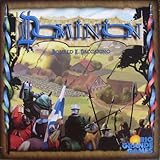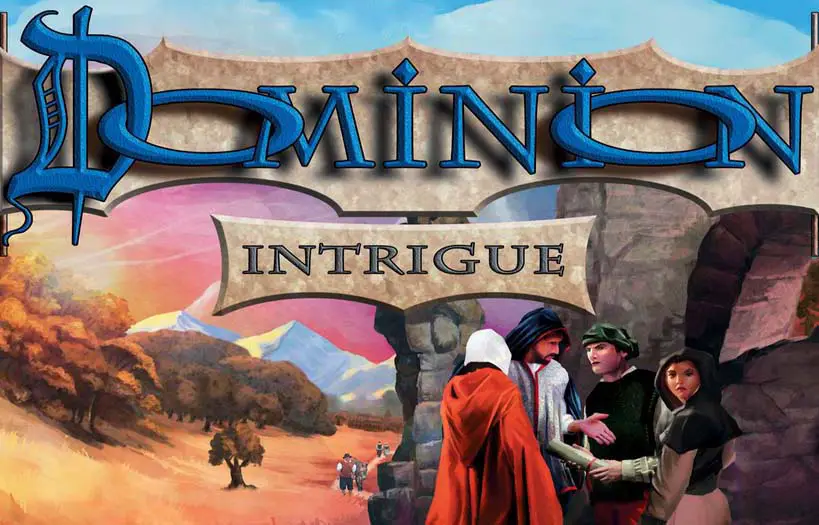
Intrigue adds 25 new Kingdom cards to Dominion. There are victory cards that do some new things for you, underlings that give you a choice as to what they do, and a variety of other people and places. These cards can be played with the cards from the basic game or on their own.
The rules include how to play a game with up to 6 players. By combining the money and victory cards with those in the basic game, players will have sufficient cards to play with more than 4 players.
Components
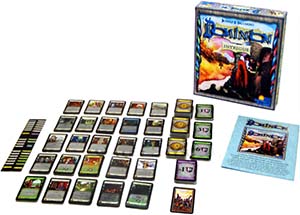
- 130 basic Treasure cards (60 Copper, 40 Silver, 30 Gold)
- 48 basic Victory cards (24 Estate, 12 Duchy, 12 Province)
- 258 Kingdom cards 10 each of Baron, Bridge, Conspirator, Coppersmith, Courtyard, Ironworks, Masquerade, Mining Village, Minion, Pawn, Saboteur, Scout, Secret Chamber, Shanty Town, Steward, Swindler, Torturer, Trading Post, Tribute, Upgrade, Wishing Well, 12 each of Duke, Great Hall, Harem, Nobles
- 30 Curse cards
- 26 Randomizer (placeholder) cards (one of each Kingdom card and 1 blank)
- 7 blank cards (to create your own Kingdom card - with those from the base game and the blank placeholder from this set, you have enough for a complete set)
- 1 Trash pile card (used to mark the Trash pile)
Object of the Game
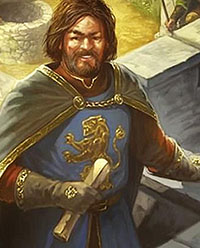
This is a game of building a Deck. The Deck represents your Dominion. It contains your resources, victory points, and the things you can do. It starts out a small sad collection of Estates and Coppers, but you hope that by the end of the game it will be brimming with Gold, Provinces, and the inhabitants and structures of your castle and kingdom.
We recommend that new players begin with the basic game.
The player with the most victory points  in his Deck at game end wins.
in his Deck at game end wins.
Setup
Randomly determine the starting player. When playing multiple games, the starting player is the player to the left of the winner of the last game. If there was a tie in the previous game, randomly choose the starting player from the players that didn't win.
Each player takes 7 Copper cards and 3 Estate cards, shuffles his 10 cards, and places them face-down in his player area (the area before him on the table) to form his Deck. Each player draws 5 cards from his Deck as his starting hand.
Players will not use all of the cards in every game. Other than the players' starting Decks, the other cards used in a game of Dominion are called the Supply. These cards are all placed face-up in the middle of the table where all players can reach them.
The randomizer card (the card with a different back) can be placed face-down at the bottom of each pile in order to help identify when the pile is empty, or when a pile becomes empty, an unused card can be placed face-down in the space to remind players that a pile of cards from the Supply is depleted. The Trash pile card is also placed near the Supply.
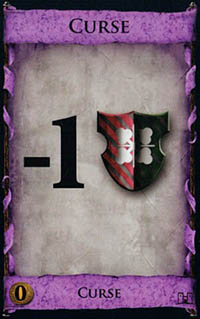
The card types (Action, Treasure, Victory, Curse, Reaction, and Attack) for each card are listed at the bottom of the card. If a card lists more than one card type, then for all purposes it counts as both types. For example, Great Hall is both an Action card and a Victory card at all times.
Copper, Silver, and Gold cards are the basic Treasure cards, and they are available in every game. After each player takes 7 Copper cards, place the remaining Copper cards and all of the Silver and Gold cards in face-up piles in the Supply.
The Treasure cards from Dominion and Dominion: Intrigue can be combined, since these cards are intended to be in abundant enough supply to not run out. (If a type of Treasure card does run out, that becomes an empty pile in the Supply, which can be important for game ending conditions).
Estate, Duchy, and Province cards are the basic Victory cards, and they are available in every game. In a 3 or 4 player game, place 12 Estate cards, 12 Duchy cards, and 12 Province cards in face-up piles in the Supply. In a 2 player game, place only 8 of each Victory card in the Supply. As in the basic game, the Victory cards are scaled based on the number of players and unused Victory cards are returned to the box.
The Curse cards are also available in every game. Place 10 Curse cards in the Supply for a 2 player game, 20 Curse cards for 3 players, and 30 Curse cards for 4 players. As in the basic game, the Curse cards are scaled based on the number of players and any unused Curse cards are returned to the box. Curse cards will most often be distributed to your opponents when you play specific Action cards (like Torturer). If you buy a Curse card, it goes in your own discard pile, like any other gained card.
Now that the basic Victory cards (Estates, Duchies, and Provinces), basic Treasure cards (Copper, Silver, Gold), and Curse cards are on the table, the players select 10 Kingdom cards and place 10 of each in face-up piles on the table (exception: Kingdom Victory cards are scaled to the number of players - 12 of each for a 3- or 4-player game or 8 for a 2-player game).
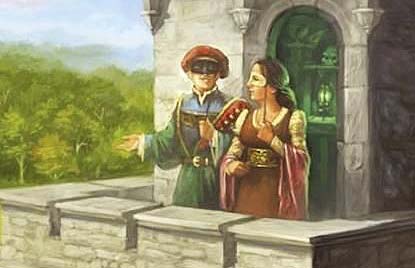
Players may choose the 10 Kingdom cards in any way that the players agree on. For example, you can use the Randomizer cards (one of each card with a different back) to randomly select 10 Kingdom cards from Dominion: Intrigue to play with. You can combine the Randomizer cards from the expansion together with those from the base game to choose 10 random Kingdom cards.
Another option is to randomly choose 5 Kingdom cards from the basic set and 5 Kingdom cards from the expansion to play with. Finally, there are some recommended sets of 10 Kingdom cards at the end of the rules that highlight specific strategies and showcase some of the possibilities with the new cards. Any Kingdom cards not chosen for the game are set aside, as they will not be used in the game.
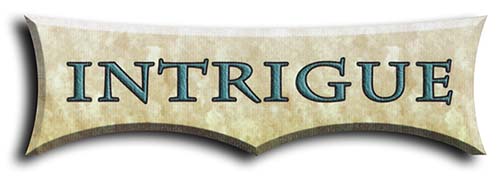
Game Play
There are three phases (a, b, and c) to each turn, taken in the order shown:
- Action phase - the player may play an Action.
- Buy phase - the player may buy a card.
- Clean-up phase - the player must discard both played and unplayed cards and draws five new cards.
A player completes all three phases, and then play passes clockwise to the next player.
I. Action Phase

In the Action phase, the player may play one Action card. Action cards are the Kingdom cards that say "Action" at the bottom of the card. Action cards allow players to do extra things during their turns.
Some Action cards give players extra actions, some give extra money to spend in the Buy phase, and so on. Since players do not start the game with any Action cards in their initial Decks of 10 cards, a player will not have any Actions to play during his first 2 turns.
Normally, a player may play only one Action card, but this number may be modified by the Action cards that the player plays.
To play an Action, the player takes an Action card from his hand and lays it face-up in his play area. He announces which card he is playing and follows the instructions written on that card from top to bottom.
The player may play an Action card even if he is not able to do everything the Action card tells him to do; but the player must do as much as he can. Detailed information about cards is in the card descriptions at the end of these rules.
Any Action cards played remain in the player's play area until the Cleanup phase of the turn unless otherwise indicated on the card. Players should not discard the cards prior to the Clean-up phase, unless directed to by the card or another action.
Here are some of the common terms used on the Action cards:
+X Action(s) - the player may play X number of additional Actions this turn. +X Action(s) adds to the number of Actions that can be played in the Action phase-it does not mean play another Action immediately. The instructions on the current Action card must be completed before playing any additional Actions.
The player must complete all of his Actions before he moves on to the Buy phase of his turn. If a card gives the player more than one additional Action, it is helpful to keep track of the number of Actions he has remaining out loud.+X Card(s) - the player immediately draws X number of cards from his Deck. If there are not enough cards in his Deck, he draws as many as he can, shuffles the Discard pile to form a new Deck, and then draws the rest. If he still does not have enough cards left after forming a new Deck, he just draws as many as he can.
+ X
 - the player has X number of additional coins to spend in the Buy phase. The player does not take additional Treasure cards for these coins.
- the player has X number of additional coins to spend in the Buy phase. The player does not take additional Treasure cards for these coins.+1 Buy - the player may buy an additional card from the Supply during the Buy phase of his turn. +1 Buy adds to your potential Buys, it does not mean to immediately buy a card during the Action phase.
Discard - unless otherwise specified, discarded cards come from the player's hand. When a player discards a card, he places the discarded card face-up onto his Discard pile.
When discarding multiple cards at once, the player need not show the cards that he is discarding to his opponents. The player may need to show how many cards he is discarding (for example, when playing Secret Chamber). The top card of a player's Discard pile will always be visible.Trash - when a player trashes a card, he places it in the Trash pile, not his Discard pile. Trashed cards are not returned to the Supply and are not available for purchase.
Gain - when a player gains a card, he takes the gained card (usually from the Supply) and puts it in his Discard pile (unless the card says specifically to put it elsewhere). The player does not get to use the ability of the card when he gains it.
Reveal - when a player reveals a card, he shows a card to all players and then returns it to wherever it came from (unless instructed specifically to put it elsewhere). If the player is required to reveal cards from the top of his Deck, and he does not have enough cards, he shuffles in order to reveal the required number of cards.
Set Aside - when a player sets aside a card, he places it face-up on the table (unless otherwise indicated) without following any instructions on the card. An Action that requires a player to set aside cards will instruct him on what to do with these cards.
There is one new term introduced in Intrigue:
Pass
When a player passes a card to another player, he places that card face down on the table between himself and the other player. The receiving player then takes the card from the table and puts it in his hand.
A passed card is not revealed to the other players. A passed card is not considered to be trashed or discarded by the player passing it and it is not considered to be gained by the player receiving it.
The Action phase ends when the player cannot or chooses not to play any more Action cards. Generally, a player can only play Action cards during the Action phase of his turn. However, Reaction cards are an exception to this rule as they can be used at other times.
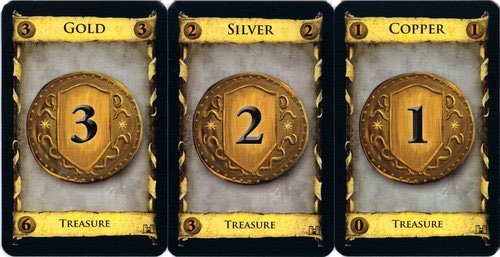
II. Buy Phase
In the Buy phase, the player can gain one card from the Supply by paying its cost. Any card that is in the Supply may be purchased (Treasure cards, Victory cards, Kingdom cards, and even Curse cards).
The player may not purchase cards from the Trash pile. Normally, a player may buy only one card, but this number may be modified by cards the player has played earlier in his Action phase.
The cost of a card is in the lower left corner. The player may play some or all of the Treasure cards from his hand to his play area on the table and add to their value the coins provided by Action cards played this turn. The player may then gain any card in the Supply of equal or lesser value. He takes the purchased card from its Supply pile and places it face-up onto his Discard pile. He may not use the ability of the card when it is gained.
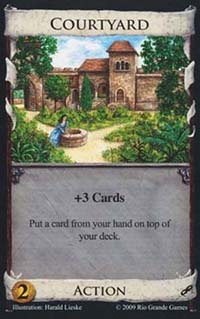
If the player has multiple Buys, he combines Treasure cards and any coins available from Action cards to pay for all of the purchases. For example, if Tyler has +1 Buy and 6 coins provided by two Gold cards, he can buy a Courtyard costing 2 and put it face-up in his Discard pile. Then Tyler can buy an Ironworks with the remaining 4 coins and place that face-up in his Discard pile, as well.
If Tyler had chosen to use all 6 coins to buy one card, he could still buy a Copper (for free) with his second buy or choose not to buy a second card. Players do not have to use all or any of their buys.
The Treasure cards remain in the play area until the Clean-up phase.
Players will use the Treasure cards multiple times during the game. They are discarded during the Clean-up phase, but the player will draw them again after his Discard pile is shuffled into a new Deck. Thus, Treasure cards can be viewed as a source of income, not a resource that is used up. When played, Coppers are worth 1 coin, Silvers, 2 coins, and Golds, 3 coins.
III. Clean-up Phase
All cards gained this turn should already be in the player's Discard pile. The player places any cards that are in his play area (Action and Treasure cards that were played in the Action and Buy phases) and any cards remaining in his hand onto his Discard pile.
The player need not show the cards remaining in his hand to his opponents. Since he places the cards in the Discard pile face-up, his opponents will always be able to see the top-most card of his Discard pile.
Then, the player draws a new hand of 5 cards from his Deck. If there are not enough cards in his Deck, he draws as many as he can, shuffles his Discard pile to form a new face-down Deck, and then draws the rest of his new hand. Once the player has drawn a new hand of 5 cards, the next player may start his turn.
Experienced players will find that the next player can begin his turn while the previous player is completing the Clean-up phase. If, however, someone plays an Attack card, each player must complete the Clean-up phase of his previous turn in order to properly resolve the Attack.
End of the Game
The game ends at the end of any player's turn when one of two conditions is met: the Supply pile of Province cards is empty OR any 3 Supply piles are empty. Each player counts up his victory points  on the cards in his entire Deck (which includes his hand and his Discard pile).
on the cards in his entire Deck (which includes his hand and his Discard pile).
The player with the most victory points wins. If the highest scores are tied at the end of the game, the tied player who has had the fewest turns wins the game. If the tied players have had the same number of turns, they rejoice in their shared victory.
Additional Rules
Read here for additional rules.
Intrigue Cards
Quick overview of the Intrigue Cards.
Intrigue Kingdom Card Descriptions.
Continue Reading
